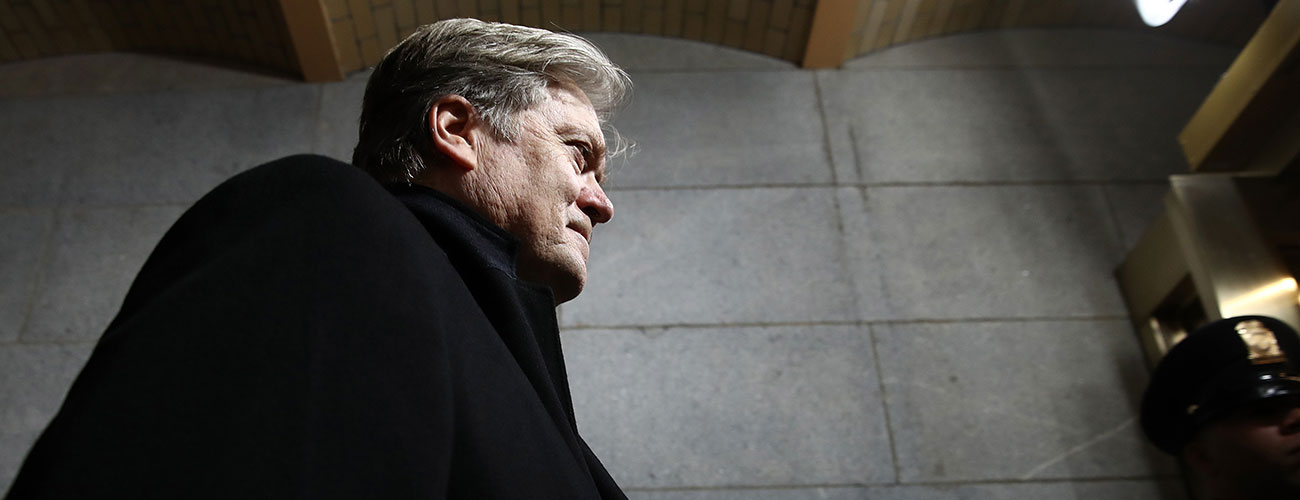Sign up for the daily CJR newsletter.
When a top White House aide called The New York Times on Wednesday to offer up the sort of cartoonish, press-hating invective that has characterized President Donald Trump’s young political career, it’s clear he was trying to bait journalists into the sort of cartoonish, self-centered overreaction that has characterized their coverage of Trump’s young political career. Our era is one of cringe-worthy symbiosis.
“The media should be embarrassed and humiliated and keep its mouth shut and just listen for awhile,” Chief White House Strategist Stephen Bannon told the Times. Fact check: Mostly true!
Bannon continued: “I want you to quote this: The media here is the opposition party….You’re the opposition party. Not the Democratic Party. You’re the opposition party. The media’s the opposition party.”
No argument here that the Trump Administration’s portrayal of the press as a hate object is ominous; another democratic norm in tatters. And put aside, for a moment, the political calculation that no doubt goes into such diatribes. The CJR Truth-O-Matic2000 finds Bannon’s second statement half-true.
With a Republican-led Congress showing few early signs that it will act as a check on Trump, the need for the media to make noise about executive power is all the more urgent. Journalists should embrace that muckraking role, while ignoring thinly veiled attempts, like Bannon’s, to draw it into partisan warfare. The mainstream press abdicated this adversarial duty during the Obama Administration, with its center-left technocratic agenda and the former president’s emotional stability and sense of decency. Trump, a shock to the system in all regards, provides as good an opportunity as any to recalibrate.
It will be a difficult slog in Washington’s hyperpolarized political swamp. It will elicit calls of hypocrisy—some of them fair—in the wake of Obama. And Trump will surely attempt to capitalize on that distrust by laying his own political traps. Step one for journalists will be to pay less attention to the Trump Administration’s attacks, whatever effect they may have in the eyes of the public, and more attention to their journalism.
After Bannon’s Times interview, which was plastered on A1 Friday (probably an overplay), there was a predictable wave of hand-wringing about creeping authoritarianism.
Steve Bannon says media should “keep its mouth shut.” Castro, Putin, Erdogan, and Xi all feel the same way! https://t.co/m2wc02MZgD
— Bret Stephens (@StephensWSJ) January 26, 2017
“The media should keep its mouth shut” is a terrifying, tyrannical comment. It’s coming from inside the White House.
— Jacob Weisberg (@jacobwe) January 26, 2017
.@camanpour: It’s ppl like Putin, Sisi, Erdogan, etc., who believe the press should be “compliant. “Of course we’re not going to ‘shut up.'” pic.twitter.com/1INewx0d2u
— Mick Krever (@mickbk) January 27, 2017
None of those takes is unwarranted or incorrect. The Trump Administration’s continued attempts to delegitimize the press are frightening, as is the broader effort to make a fact-based debate more difficult. But after a year and a half of the press responding to such broadsides with full-throated counterattacks on behalf of democratic norms, you begin to question their long-term effectiveness.
What’s more, with so much news coming out of the Trump Administration’s first week in power—executive actions, confirmation hearings, legislative proposals, foreign policy confusion—the Trump-media tiff distracts from everything else going on that affects real people. We can follow both things, journalists always tell themselves. Maybe. But can the audience? Or, to pose it in a way that hurts our sense of self-importance, does the audience even want to?
In one respect, that the Trump-media storyline has persisted so long is a testament to both sides’ respective narcissism. But there are some signs that journalists and media executives are slowly trying to disentangle themselves from this tit-for-tat game of outrage.
“We are all aware of what is happening around us,” NBC’s Lester Holt said at Columbia University’s duPont Awards ceremony this week. “The attacks on our legitimacy. The efforts to undermine our relevance. And I know I am expected to say something profound. But here’s all I got: Do our jobs. Do our jobs….What we can’t do is get trapped in a debate. We are not at war with anyone or any entity. That’s what some would hope for. We cannot afford to be seen as petty or on someone’s side.”
CNN President Jeff Zucker, an unusual source for journalistic inspiration, added in a University of Chicago event that journalists “need to do our jobs, not be intimidated and worried about what Steve Bannon calls us.”
The Trump Administration will continue calling critical media mean names. It will try to undermine the journalistic enterprise wholesale. No amount of well-reasoned arguments about a free press’ role in democracy will change that. If the media is as crucial as we all claim it to be, it’s time to show the public—not tell it—and reclaim the role of agitator on our own journalistic terms.
Has America ever needed a media defender more than now? Help us by joining CJR today.







